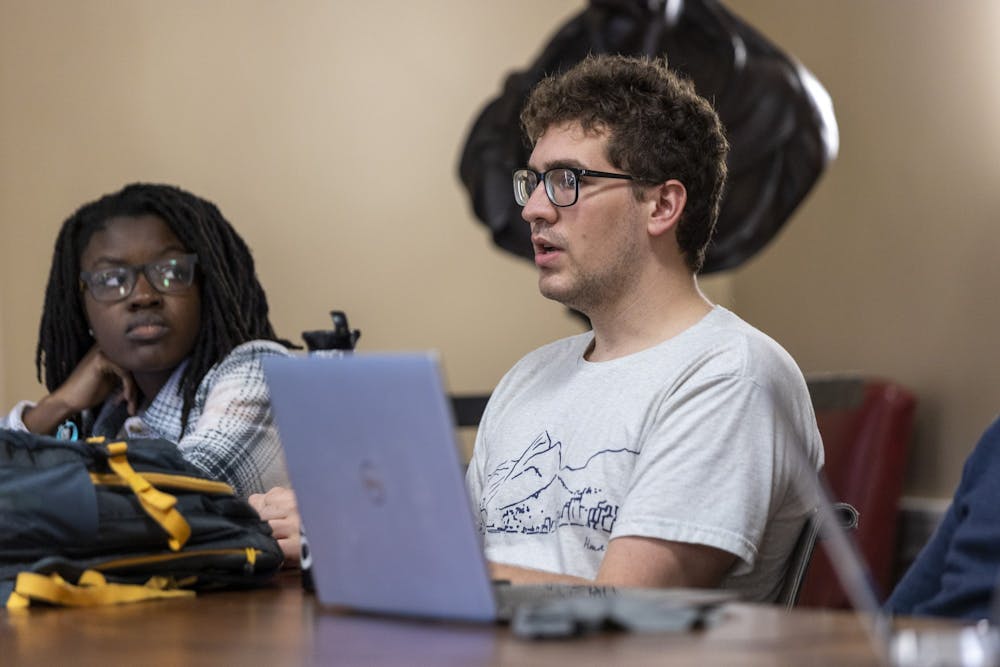The Honor Committee discussed final details for the Honor Town Hall — a chance for the Committee to field student questions about the multi-sanction system — and also considered possible solutions for sanction noncompliance. Since there were 15 out of 21 members present at the meeting Sunday, the Committee reached quorum and was able to vote on constitutional and bylaw matters.
The Honor Committee town hall, held Monday, served as an open forum for students to share their thoughts, feedback and questions regarding the newly passed multi-sanction system. The new system will implement a range of new sanctions for students found guilty of an honor offense — including but not limited to a temporary leave of absence, expulsion, education or amends.
Hamza Aziz, chair of the Committee and third-year College student, said the gathering serves an important function as a place for students to talk directly to the Committee.
“We want to hear what [students] have to say,” Aziz said. “[The town hall] is another avenue and more accessible for students who don’t want to come to the Committee meetings.”
As the multi-sanction system nears its formal ratification July 1, the Committee is considering defining solutions for sanction noncompliance in their bylaws. These bylaws would detail steps to take if a student found guilty fails to comply with their original sanction — currently, there is no legislation for noncompliance.
“We should probably put some weight behind the sanctions to signify why those are important,” Aziz said. “It’s very much up to us to decide what that could be.”
The Committee discussed class registration as a potential noncompliance sanction at the last meeting, with representatives detailing the possibility of having a class registration hold until a student has completed their original sanction.
Graduate Engineering Rep. Kasra Lekan proposed two different options for the noncompliance sanction, either that the sanction be chosen by a sanctioning panel — made up of students and Honor representatives — or that a standardized noncompliance sanction would be created and applied to all cases.
“The point of having [a noncompliance sanction] is a means by which to ensure that people actually follow through with the deadline [of the sanction],” Lekan said.
The Committee also considered a warning system in which a student not acting in accordance with a sanction within a set time period would be issued a warning. These warnings would continue until the student complied with their sanction.
Rachel Liesegang, chair for the undergraduate community and third-year College student, said she agreed with the idea of creating a warning system, citing the importance of notice for sanctioned students rather than immediate action. Lisengag also said that the sanction should take into account whether a student is being non-responsive or facing other difficulties in carrying out their original sanction.
“I feel like we should also have a sort of an asterisk saying that the Vice Chair for Sanctions can grant extensions as necessary to make sure that when we set a deadline, that deadline has the opportunity to be changed based on extenuating circumstances,” Liesegang said.
Outside of discussion on sanction noncompliance, the Committee also plans to send out a College-wide survey assessing the student body’s perspective on the Honor system. Tentative topics of the survey include the meaning of rehabilitation in the multi-sanction system, as well as student commitment to the Community of Trust. There is no set date for when the survey will be sent out, but is planned to be sent to students soon.
“I think that [the survey responses] be a good thing for us to know and then we can use those responses to make [Honor] education happen over the summer,” Aziz said.
The Committee also heard executive and school updates. There is one active investigation. A working subgroup has been formed to create a document for sanctioning guidelines — an evolving document detailing possible sanctions not included in the bylaws or the constitution.
The Committee is also working on bringing back O-Day, a boot camp event before the academic year to train Honor support officers — around 100 students whose main role is to staff cases as either advisors, counselors or educators. The event hasn’t occurred in roughly four years due to the COVID-19 pandemic. The tentative date for O-Day is August 19.
Representatives are also planning to work with the Student Disability Access Center to provide more spaces for students with accommodations to take finals and midterms in the upcoming year.
The meeting adjourned at its scheduled end time of 8 p.m. The next Honor Committee will be a virtual meeting May 14 and the link will be available on the Honor website. The Committee will continue to meet virtually between May 14 and July 1 on either a biweekly or weekly basis to develop and pass bylaws for the multi-sanction system.







